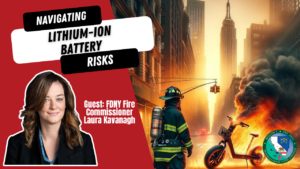FDNY Fire Commissioner
Laura Kavanagh
ICC Region I Radio
In a world increasingly powered by portable energy, the topic of lithium-ion batteries is not just relevant; it’s critical. The shift towards devices that require rechargeable power sources, from smartphones to e-bikes, has brought with it a new set of challenges and solutions in fire safety. This discussion takes a deep dive into these issues, guided by the insights of Commissioner Laura Kavanagh of the FDNY, on ICC Region I Radio. Kavanagh’s journey—from her roots in public service to leading the nation’s largest fire department—sheds light on the evolving landscape of fire safety in an age dominated by lithium-ion technology.
Fire Safety Leadership
Laura Kavanagh’s path to becoming the Commissioner of the FDNY is both inspiring and informative. Her career underscores a deep-seated dedication to public service, molded by a background rich in public service. As the head of the FDNY, her leadership is pivotal in addressing the modern challenges of fire safety, particularly those presented by the widespread use of lithium-ion batteries.
The Lithium-Ion Battery Challenge
Lithium-ion batteries are widespread, powering a vast array of devices we use daily. However, their benefits come with significant risks, especially when it comes to fire safety. Kavanagh highlights the FDNY’s strategies to mitigate these risks, focusing on public awareness and safety measures. The conversation delves into the specific dangers posed by micromobility devices like e-bikes and e-scooters, especially under the demanding conditions of urban environments like New York City.
Key Insights and Strategies
- Public Education and Awareness: The cornerstone of FDNY’s approach is to educate the public about the risks associated with lithium-ion batteries and the importance of using certified products.
- Regulatory Measures: New York City has taken proactive steps, including banning non-UL certified devices and proposing new licensing for last-mile delivery devices, to ensure safety.
- Collaboration with Retailers: Partnering with retailers to inform consumers about the risks of uncertified products and the dangers of counterfeit safety labels is crucial.
FAQ: Understanding Lithium-Ion Battery Safety
Q: What makes lithium-ion batteries a significant fire risk?
A: Lithium-ion batteries can pose a fire risk due to their chemical composition and the potential for thermal runaway, especially if damaged or improperly charged.
Q: How can consumers ensure their devices are safe?
A: Consumers should only purchase devices with batteries that are UL certified, indicating they have passed rigorous safety tests.
Your Safety and Lithium-Ion Batteries
How do you ensure the lithium-ion batteries in your devices are safe? Share your tips and experiences in the comments to help spread awareness and promote safety in our communities.
Advocacy and Collaboration: Shaping a Safer Tomorrow
Commissioner Kavanagh emphasizes the importance of advocacy and collaboration, not just at the local level but also on a national scale. New York City’s efforts to influence legislation and share best practices are vital in addressing the challenges posed by lithium-ion batteries. The development of a physical training facility focused on lithium-ion battery response is a testament to FDNY’s commitment to leading by example and assisting fire services nationwide.
Conclusion: A Commitment to Safety and Innovation
This in-depth discussion with Commissioner Laura Kavanagh on ICC Region I Radio provides a comprehensive overview of the FDNY’s efforts to tackle the challenges of lithium-ion battery safety. Through education, regulation, and enforcement, the FDNY is paving the way for a safer future. Kavanagh’s leadership and the FDNY’s initiatives serve as a model for fire departments and safety organizations worldwide.
Watch the full discussion on YouTube:

https://youtu.be/QGxu1zOZaxo?si=wqMift1Pk85ZOrHs
Or listen

